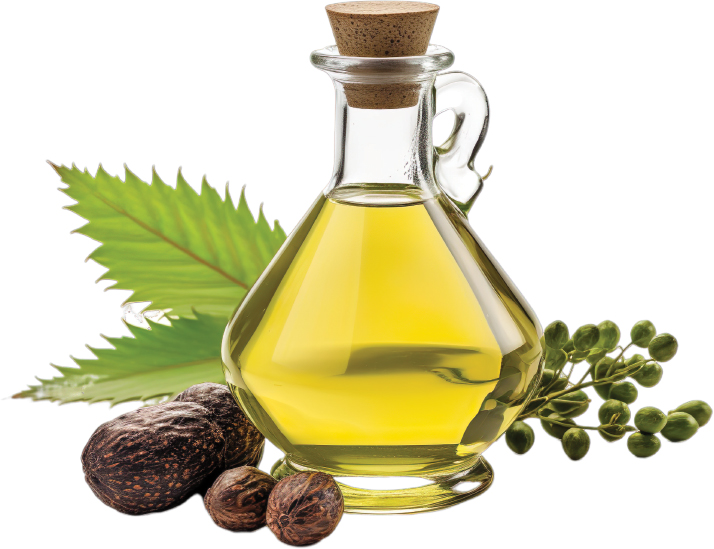
Yen Nien (Jason) Hou, PharmD, DiplOM, LAc

Jyothirmai Gubili, MS
The ASCO Post’s Integrative Oncology series is intended to facilitate the availability of evidence-based information on integrative and complementary therapies sometimes used by patients with cancer. In this installment, Yen Nien (Jason) Hou, PharmD, DiplOM, LAc, and Jyothirmai Gubili, MS, focus on the many uses of castor oil, from laxative to labor-inducing agent, as well as renewed interest in it as an anticancer agent.
Scientific Name: Ricinus communis
Common Names: Palm of Christ, Palma Christi, Ricinus oil, Oleum Ricini, Castor Bean oil
Overview
Castor oil, extracted from the bean of the shrub Ricinus communis, has a centuries-long history as a remedy for constipation, stomach aches, colds, and fever as well as a labor-inducing agent. It was also used to treat breast tumors by Hippocrates and Galen.1 Castor oil packs again grew in popularity in the 1920s for eradicating tumors near the breast surface.2
OF NOTE
Physicians should be aware that castor oil is being promoted as a treatment of breast cancer. There are no studies in humans that indicate castor oil has anticancer effects.
Castor oil is currently used as a laxative and as a component in cosmetics, drug-delivery systems, and wound dressings.3,4 It is also being promoted as a breast cancer treatment on social media despite the lack of any clinical evidence.
The Science
Although preclinical models indicate that castor oil has anti-inflammatory, antioxidant, antinociceptive, wound-healing, cytotoxic, and antimicrobial effects,3 clinical studies are limited. In a randomized trial of 100 patients with knee osteoarthritis, symptom improvement was similar with both a castor oil capsule (0.9 mL, thrice daily) or a diclofenac sodium capsule (50 mg, thrice daily) after 4 weeks of treatment (P < 0.001). Those who took castor oil had no adverse effects such as upset stomach, heartburn, or nausea, which were reported with diclofenac sodium.5
A meta-analysis of six studies comprising 701 patients concluded that castor oil may help to improve both the completion and polyp detection rates in colon capsule endoscopy by increasing the excretion rate (92% with castor oil vs 73% with controls). According to the study authors, castor oil may potentially be used as a laxative regimen for bowel preparation.6
Guest Editor

Jun J. Mao, MD, MSCE
Dr. Mao is the Laurance S. Rockefeller Chair in Integrative Medicine and Chief of Integrative Medicine Service at Memorial Sloan Kettering Cancer Center, New York.
Castor oil has also been studied as a labor-inducing agent. A systematic review of 12 studies consisting of 1,653 pregnant women reported that compared with controls, labor induction was significantly higher in those who took castor oil (relative risk = 3.27; 95% confidence interval = 1.96–5.46).7
In oncology settings, castor oil was shown to exert antiproliferative effects against breast cancer cells.8 It was also found to suppress tumors in a murine model.9
Additionally, topical use of a formula containing trypsin, Balsam of Peru and hydrogenated castor oil enhanced wound healing in a patient with breast cancer after undergoing radical mastectomy.10 However, castor oil has not been shown to have anticancer effects in humans.
Ricinoleic acid, the main component in castor oil, is believed to be responsible for its laxative effects by influencing water flux, intestinal motility, and intestinal ion transport.11
Adverse Effects
Abdominal cramping, vomiting, bloating, and dizziness have been reported following the use of castor oil.12
Accidental ingestion of castor beans has resulted in anaphylactic shock, and exposure to castor bean dust has led to respiratory symptoms with asthma or rhinitis.13
Administration of tea containing castor oil to newborns to encourage passage of the first stool has resulted in fatal sepsis.14

Contraindications
Pregnant women should avoid castor oil because it can cause premature contractions.15
Patients with gastrointestinal issues including appendicitis, perforation, and inflammatory bowel disease, as well as those with anorexia nervosa or bulimia,16 should not ingest castor oil, as it may worsen symptoms.
Summary
The U.S. Food and Drug Administration recognizes castor oil as a safe and effective stimulant laxative; however, it is not approved for preventing or treating any medical condition, including cancer. Despite its widespread popularity on social media, there is no scientific evidence to support use of castor oil for treating breast cancer lesions. Furthermore, relying on this method based on a viral story may delay timely and appropriate medical treatments.
For additional information, visit the “About Herbs” Website at https://www.mskcc.org/cancer-care/integrative-medicine/herbs/castor-oil.
DISCLOSURE: Dr. Hou and Ms. Gubili reported no conflicts of interest.
REFERENCES
1. Lukong KE: Understanding breast cancer: The long and winding road. BBA Clin 7:64-77, 2017.
2. Levitsky DO, Dembitsky VM: Anti-breast cancer agents derived from plants. Nat Prod Bioprospect 5:1-16, 2014.
3. Elkousy RH, Said ZNA, Abd El-Baseer MA, et al: Antiviral activity of castor oil plant (Ricinus communis) leaf extracts. J Ethnopharmacol 271:113878, 2021.
4. Kelly AJ, Kavanagh J, Thomas J: Castor oil, bath and/or enema for cervical priming and induction of labour. Cochrane Database Syst Rev 2013:CD003099, 2013.
5. Medhi B, Kishore K, Singh U, et al: Comparative clinical trial of castor oil and diclofenac sodium in patients with osteoarthritis. Phytother Res 23:1469-1473, 2009.
6. Deding U, Jensen SS, Schelde-Olesen B, et al: Castor oil in bowel preparation regimens for colon capsule endoscopy: A systematic review with meta-analysis. Diagnostics (Basel) 12:2795, 2022.
7. Amerizadeh A, Farajzadegan Z, Asgary S: Effect and safety of castor oil on labor induction and prevalence of vaginal delivery: A systematic review and meta-analysis. Iran J Nurs Midwifery Res 27:251-259, 2022.
8. Majumder M, Debnath S, Gajbhiye RL, et al: Ricinus communis L. fruit extract inhibits migration/invasion, induces apoptosis in breast cancer cells and arrests tumor progression in vivo. Sci Rep 9:14493, 2019.
9. Xiu S, Lu D, Li B, et al: [Antitumor effect of castor oil extract]. Zhongguo Zhong Yao Za Zhi 17:560-561, 1992.
10. McDougall CJ, Franklin LE, Gresle SO: Management of radiation dermatitis in a patient after mastectomy. J Wound Ostomy Continence Nurs 32:337-340, 2005.
11. Tunaru S, Althoff TF, Nüsing RM, et al: Castor oil induces laxation and uterus contraction via ricinoleic acid activating prostaglandin EP3 receptors. Proc Natl Acad Sci U S A 109:9179-9184, 2012.
12. Sani KG, Jafari MR, Shams S: A comparison of the efficacy, adverse effects, and patient compliance of the Sena-Graph® syrup and castor oil regimens for bowel preparation. Iran J Pharm Res 9:193-198, 2010.
13. Coattrenec Y, Jaques D, Jandus P, et al: Anaphylactic shock following castor bean contact: A case report. Allergy Asthma Clin Immunol 13:50, 2017.
14. Baptiste WJ, Casseus M, Dev A, et al: The dangers of castor oil tea in neonates in rural Haiti: A case report. Front Pediatr 11:877550, 2023.
15. Xing JH, Soffer EE: Adverse effects of laxatives. Dis Colon Rectum 44:1201-1209, 2001.
16. Roerig JL, Steffen KJ, Mitchell JE, et al: Laxative abuse: Epidemiology, diagnosis and management. Drugs 70:1487-1503, 2010.
Dr. Hou is Manager of the “About Herbs” website, maintained by Memorial Sloan Kettering Cancer Center’s Integrative Medicine Service. Ms. Gubili is Editor, also at the Integrative Medicine Service, Memorial Sloan Kettering Cancer Center, New York.

